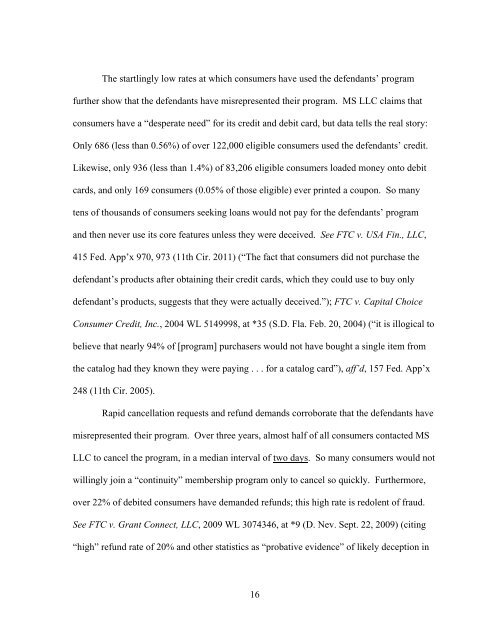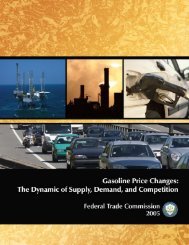Plaintiff Federal Trade Commission's Motion for an Order to Show ...
Plaintiff Federal Trade Commission's Motion for an Order to Show ...
Plaintiff Federal Trade Commission's Motion for an Order to Show ...
Create successful ePaper yourself
Turn your PDF publications into a flip-book with our unique Google optimized e-Paper software.
The startlingly low rates at which consumers have used the defend<strong>an</strong>ts’ program<br />
further show that the defend<strong>an</strong>ts have misrepresented their program. MS LLC claims that<br />
consumers have a “desperate need” <strong>for</strong> its credit <strong>an</strong>d debit card, but data tells the real s<strong>to</strong>ry:<br />
Only 686 (less th<strong>an</strong> 0.56%) of over 122,000 eligible consumers used the defend<strong>an</strong>ts’ credit.<br />
Likewise, only 936 (less th<strong>an</strong> 1.4%) of 83,206 eligible consumers loaded money on<strong>to</strong> debit<br />
cards, <strong>an</strong>d only 169 consumers (0.05% of those eligible) ever printed a coupon. So m<strong>an</strong>y<br />
tens of thous<strong>an</strong>ds of consumers seeking lo<strong>an</strong>s would not pay <strong>for</strong> the defend<strong>an</strong>ts’ program<br />
<strong>an</strong>d then never use its core features unless they were deceived. See FTC v. USA Fin., LLC,<br />
415 Fed. App’x 970, 973 (11th Cir. 2011) (“The fact that consumers did not purchase the<br />
defend<strong>an</strong>t’s products after obtaining their credit cards, which they could use <strong>to</strong> buy only<br />
defend<strong>an</strong>t’s products, suggests that they were actually deceived.”); FTC v. Capital Choice<br />
Consumer Credit, Inc., 2004 WL 5149998, at *35 (S.D. Fla. Feb. 20, 2004) (“it is illogical <strong>to</strong><br />
believe that nearly 94% of [program] purchasers would not have bought a single item from<br />
the catalog had they known they were paying . . . <strong>for</strong> a catalog card”), aff’d, 157 Fed. App’x<br />
248 (11th Cir. 2005).<br />
Rapid c<strong>an</strong>cellation requests <strong>an</strong>d refund dem<strong>an</strong>ds corroborate that the defend<strong>an</strong>ts have<br />
misrepresented their program. Over three years, almost half of all consumers contacted MS<br />
LLC <strong>to</strong> c<strong>an</strong>cel the program, in a medi<strong>an</strong> interval of two days. So m<strong>an</strong>y consumers would not<br />
willingly join a “continuity” membership program only <strong>to</strong> c<strong>an</strong>cel so quickly. Furthermore,<br />
over 22% of debited consumers have dem<strong>an</strong>ded refunds; this high rate is redolent of fraud.<br />
See FTC v. Gr<strong>an</strong>t Connect, LLC, 2009 WL 3074346, at *9 (D. Nev. Sept. 22, 2009) (citing<br />
“high” refund rate of 20% <strong>an</strong>d other statistics as “probative evidence” of likely deception in<br />
16
















